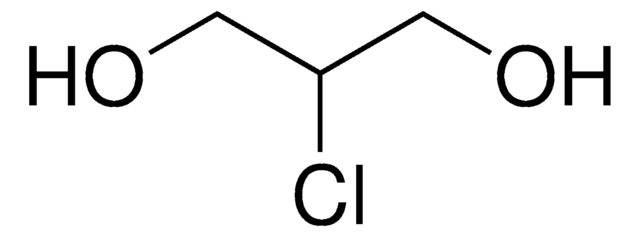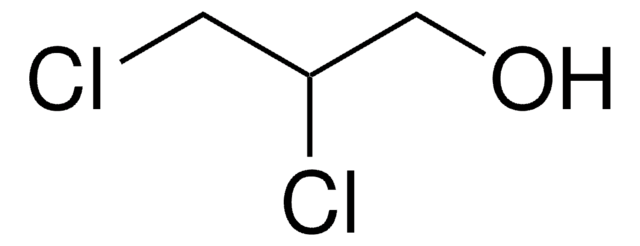G5809
Glycidol
96%
Synonyme(s) :
(±)-Glycidol, (±)-Oxirane-2-methanol, 2,3-Epoxy-1-propanol, Glycerolglycide
About This Item
Produits recommandés
Densité de vapeur
2.15 (vs air)
Niveau de qualité
Pression de vapeur
0.9 mmHg ( 25 °C)
Pureté
96%
Forme
liquid
Température d'inflammation spontanée
780 °F
Impuretés
≤2% diglycidyl ether
Indice de réfraction
n20/D 1.433 (lit.)
Point d'ébullition
61-62 °C/15 mmHg (lit.)
Densité
1.117 g/mL at 25 °C (lit.)
Conditions d'expédition
wet ice
Température de stockage
2-8°C
Chaîne SMILES
OCC1CO1
InChI
1S/C3H6O2/c4-1-3-2-5-3/h3-4H,1-2H2
Clé InChI
CTKINSOISVBQLD-UHFFFAOYSA-N
Vous recherchez des produits similaires ? Visite Guide de comparaison des produits
Catégories apparentées
Application
Mention d'avertissement
Danger
Mentions de danger
Classification des risques
Acute Tox. 2 Inhalation - Acute Tox. 4 Dermal - Acute Tox. 4 Oral - Carc. 1B - Eye Irrit. 2 - Muta. 2 - Repr. 1B - Skin Irrit. 2 - STOT SE 3
Organes cibles
Respiratory system
Code de la classe de stockage
6.1A - Combustible acute toxic Cat. 1 and 2 / very toxic hazardous materials
Classe de danger pour l'eau (WGK)
WGK 3
Point d'éclair (°F)
161.6 °F
Point d'éclair (°C)
72 °C
Équipement de protection individuelle
Eyeshields, Faceshields, Gloves, type ABEK (EN14387) respirator filter
Certificats d'analyse (COA)
Recherchez un Certificats d'analyse (COA) en saisissant le numéro de lot du produit. Les numéros de lot figurent sur l'étiquette du produit après les mots "Lot" ou "Batch".
Déjà en possession de ce produit ?
Retrouvez la documentation relative aux produits que vous avez récemment achetés dans la Bibliothèque de documents.
Chromatograms
suitable for GCsuitable for GCsuitable for GCNotre équipe de scientifiques dispose d'une expérience dans tous les secteurs de la recherche, notamment en sciences de la vie, science des matériaux, synthèse chimique, chromatographie, analyse et dans de nombreux autres domaines..
Contacter notre Service technique









